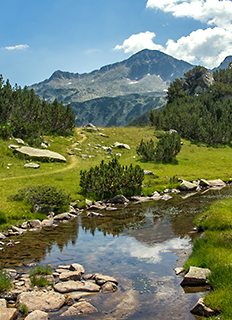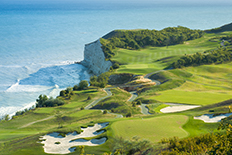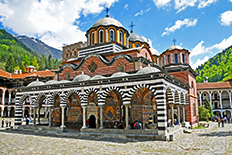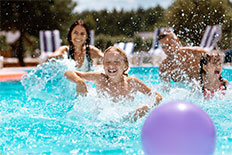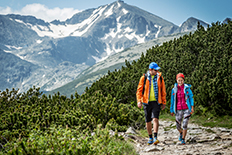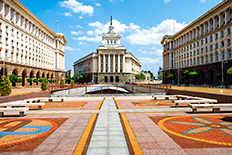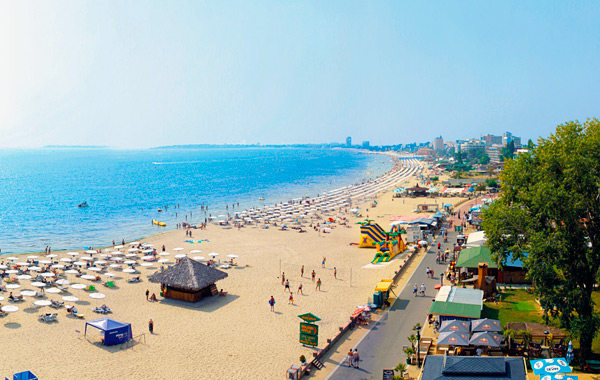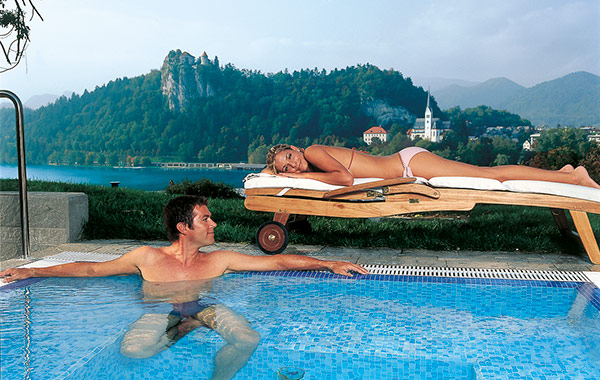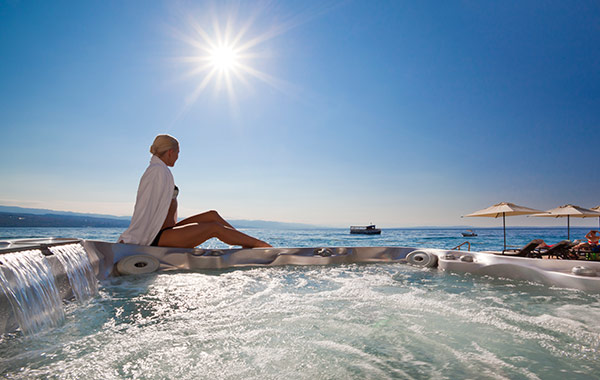- HOLIDAY TYPES
- DESTINATIONS
- BULGARIA
- Bourgas Area
- Sunny Beach
- Nessebar
- Sozopol
- Duni
- Pomorie
- St Vlas
- Obzor
- Varna Area
- Golden Sands
- Albena
- St Constantine and Helena
- Bulgaria Mountains
- Bansko
- Borovets
- Pamporovo
- EXTRAS
Bulgaria Holidays
Characterised by diverse terrain shapes, long sun-drenched beaches, soaring mountain scenery and a warm, colourful culture and hospitality that has remained unchanged for centuries, a holiday to Bulgaria has it all.
Summer Holidays
Our collection of great value for money Summer holidays in Bulgaria
Winter Holidays
Bulgaria makes an ideal choice for an action packed value for money ski or snowboard holiday. With a wide range of accommodation the resorts of Bansko, Borovets and Pamporovo continue to prove popular choices for skiers and snowboarders, thanks to the excellent facilities, wide and groomed pistes and unbeatably priced apres ski.
Bulgaria Winter Holidays ➤
Bulgaria Winter Holidays ➤
Ski and Snowboard
Popular Holiday Resorts in Bulgaria
Travel Guide
Bulgaria is a beautiful country, rich in culture and traditions and with a lot to offer ranging from the beautiful Black Sea Resorts to internationally renowned ski resorts. Bulgaria is also a warm and welcoming country, boasting a lot of character, history and outstanding beach and ski resorts.
History
Bulgaria's history is greatly influenced by its location between East and West, with waves of settlers travelling across its land throughout the years. This invariably led to clashes and an exchanging of cultures, before eventually developing into the fascinating and diverse country that it is today.
Everywhere in the country there are interesting insights into its culture and history, with visitors able to get a glimpse into the Bulgarian way of life. The Bulgarian state was born in medieval times and since then an individual identity has emerged. It was based upon the Slav language and was a predecessor to the Bulgaria that can be seen today.
Culture
Modern Bulgarians are the product of influences brought by all the peoples that have populated the land over the millennia. These include Illyrians, Greeks, Thracians, Romans, Slavs and Bulgarians. The customs that are found in much of the country can be traced back to antiquity and in some small villages in the Balkan mountain range, dancing on hot coals is still practised.
Another ritual, which is still performed, is that of the Mummers games, when men don masks and costumes to frighten away evil spirits. This is usually performed on New Year's Eve and can be found in remote areas of the country.
Bulgarian culture is also closely linked to Eastern Orthodox Christianity and festivals relating to the cycle of life are very important. This means that big festivities are held within families to mark births, christenings, weddings and funerals, as well as saints' days.
Language
It is a good idea to know a few phrases in Bulgarian when you visit to help you along. Despite the majority of people speaking English, opening with a 'zdravei' or showing your gratitude by saying 'blagodarya' will always go down well.
Bulgarian is based on the Cyrillic script, which originated in the Preslav Literary School around the ninth century. It is on the Slavic branch of Indo-European languages and is characterised by a lack of infinitives when it comes to verbs. It also has special forms to express doubtful actions.
Bulgarian is based on the Cyrillic script, which originated in the Preslav Literary School around the ninth century. It is on the Slavic branch of Indo-European languages and is characterised by a lack of infinitives when it comes to verbs. It also has special forms to express doubtful actions.
Weather
Seasons are distinct in Bulgaria with cold winters and warm summers. Holidaymakers in the country will experience a sunny climate with an average temperature of 27 C during the summer months. This is accompanied by 300 hours of sunshine during the high season, making it the perfect destination for beach holidays.
In winter, the average temperature ranges from 0 to 5 C with abundant snowfall, especially in the mountainous areas of the nation. This makes it a wonderful place to go skiing or snowboarding, as the conditions are reliable.
Geography
Located to the south-east of the Balkan Peninsula, Bulgaria is blessed with a large variety of terrain, making it small, but perfectly formed. This ranges from the expansive beaches of the Black Sea to the high peaks of the Balkan, Rhodope and Vitosha mountain ranges. Low lying and forested areas also add diversity to the country's geography and offers alternative recreational possibilities.
Regions
Bulgaria can be split into eight regions: Sofia, Rila and Pirin, the Rhodopes, Thrace; the Black Sea coast, old Bulgarian capitals, Stara Planina Mountain and the Danube. Each of these areas has its own character and unique draws, making the country a fascinating place to compare and contrast cultures and landscape.
Cities
The capital of Bulgaria, Sofia is strategically located at a crossroads between the east and west and exhibits influences from these cultures. Its relatively high altitude at 550 metres above sea level makes it cooler than other parts of the country during the summer months. Here you will find many of Bulgaria's top cultural institutions, as well as monuments to its long and interesting past.
Plovdiv is the second largest of Bulgaria's cities and is characterised by plenty of parks and gardens, giving it an overall more picturesque feel. The old town has been restored to resemble its former incarnation in the 19th century and is a pleasant place to stroll and stop in cafes bursting with character.
Varna on the Black Sea coast owes much of its charm to its maritime history, which it combines with modern attractions. Visitors may be keen to see the huge Roman bath complex at the city's centre or spend time learning about the archaeological finds from surrounding areas in its well-laid-out museum.
Also located on the Black Sea is the city of Bourgas, which is relatively modern compared to the three larger metropolises of Bulgaria. It is convenient for a wide number of attractions, including boats to St Anastasia Island, and is surrounded by three lakes.
Money
The currency of Bulgaria is the lev and at present, visitors can exchange £1 in sterling for approximately 2.2 levs. Be aware that most places will not accept Scottish notes and few businesses allow payment by credit card. Cash machines can be found in all the major resorts and levs can be purchased prior to travel to Bulgaria.
Weather
Average High Temperature (°C)
20
10
0
0
5
10
15
J
F
M
A
M
J
J
A
S
O
N
D
Average days with sun
Map
Quick Facts
 Capital
CapitalSofia
 Language
LanguageBulgarian
 Time Zone
Time ZoneGMT +2
 Arrival airports
Arrival airportsBourgas, Varna, Sofia
 Flying Time
Flying Time3hrs - 4hrs
 Beach Resorts
Beach Resorts12
 Lakes & Mountains Resorts
Lakes & Mountains Resorts2
 City Break Cities
City Break Cities4
 Golfing Resorts
Golfing Resorts3
Currency
 Currency
Currency
Bulgarian Lev (BGN)
 Typical cost of
Typical cost of
Lunch Pizza - £3
Local Beer - under £1
Three Course Meal - £10
Resort List
More Holiday Ideas
Why book with us?
Balkan Holidays has 59 years of experience in providing great value summer and
winter holidays
and since 1966 we have sold millions of holidays.
From Your
Local Airport
Local Airport
Trust
the Specialist
the Specialist
Free
Child Places
Child Places
Fully Protected
Holidays
Holidays
No Hidden
Fees
Fees
Loyalty
Discount
Discount

